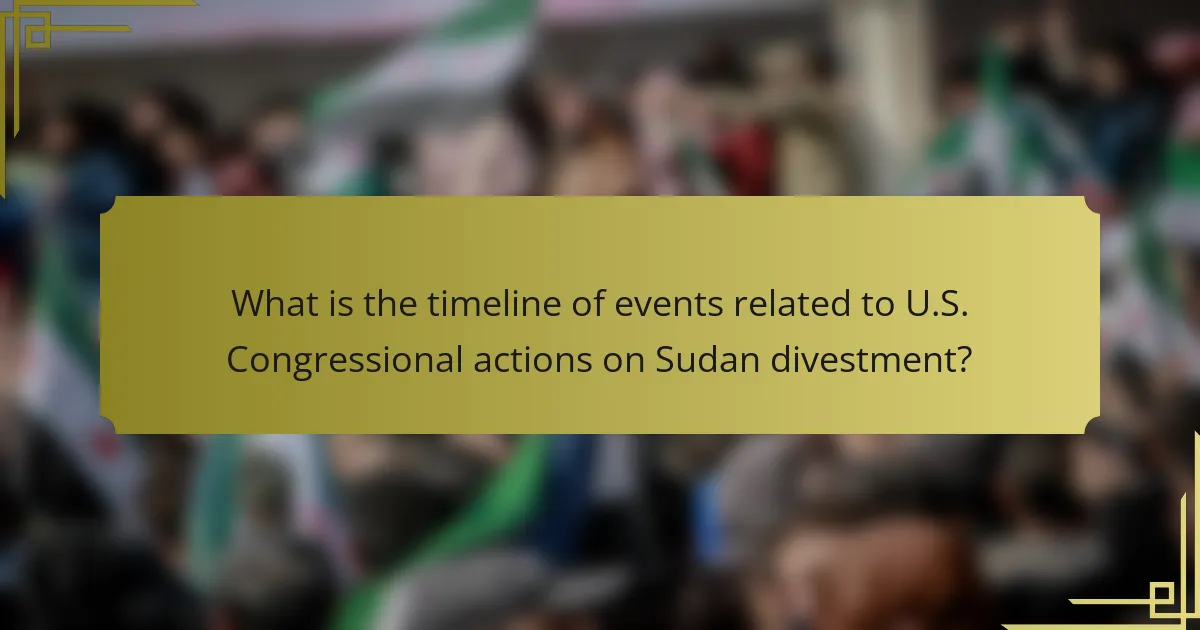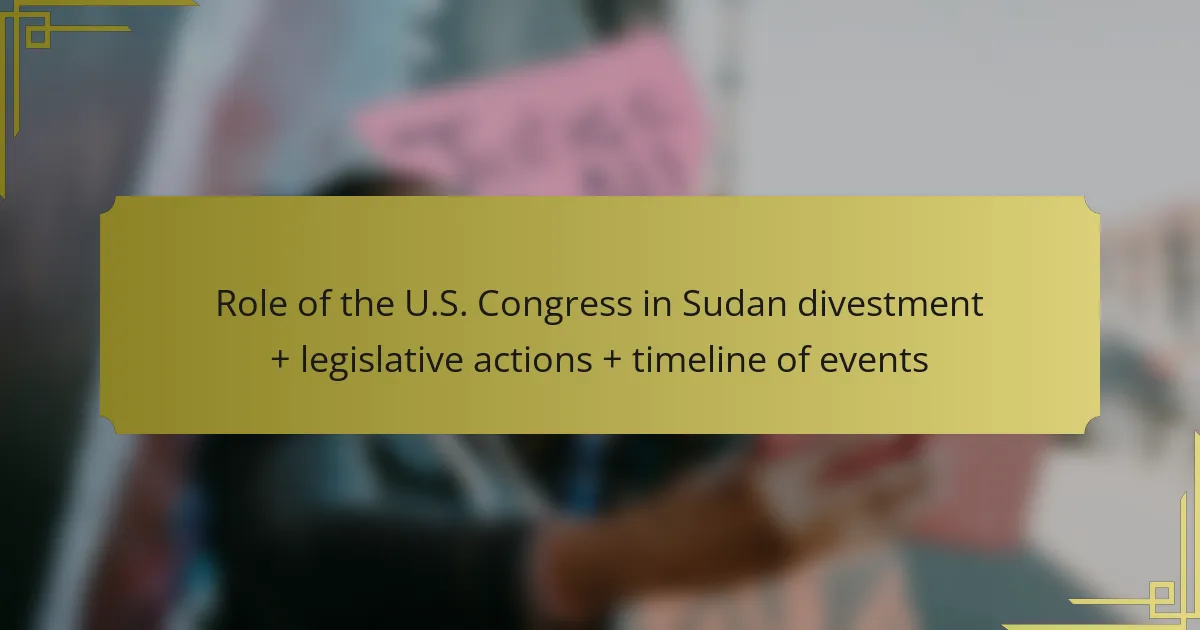The U.S. Congress plays a pivotal role in the divestment from companies that support the Sudanese government, particularly in response to human rights abuses in Darfur. Key legislative actions include the Sudan Accountability and Divestment Act of 2007, which enables states to divest from such companies, and various resolutions and hearings aimed at raising awareness and influencing public policy. Over the years, Congress has introduced numerous bills to enhance transparency and scrutiny of investments linked to Sudan, reflecting an ongoing commitment to promoting human rights and accountability. Current trends indicate a push for stricter regulations and comprehensive sanctions, which may further isolate the Sudanese government economically and impact U.S. businesses with ties to the region.

What is the Role of the U.S. Congress in Sudan Divestment?
The U.S. Congress plays a crucial role in Sudan divestment by enacting legislation that encourages divestment from companies supporting the Sudanese government. Congress passed the Sudan Accountability and Divestment Act in 2007, which allows states and municipalities to divest from companies involved in the genocide in Darfur. This act aimed to pressure the Sudanese government to end human rights abuses. Congress also holds hearings to raise awareness and influence public opinion on Sudan’s situation. Furthermore, congressional resolutions can express condemnation of the Sudanese government’s actions, prompting further divestment actions. The legislative actions taken by Congress have led to significant financial impacts on companies operating in Sudan. Through these measures, Congress seeks to promote human rights and accountability in Sudan.
How has Congress influenced Sudan divestment policies?
Congress has significantly influenced Sudan divestment policies through legislative actions and resolutions. In 2007, Congress passed the Sudan Accountability and Divestment Act. This act encouraged states and companies to divest from Sudan to pressure its government regarding human rights abuses. Additionally, various resolutions have been introduced to raise awareness and support divestment efforts. Congress has also held hearings to investigate the impact of divestment on Sudan’s government and economy. These collective actions have shaped public policy and corporate behavior regarding investments in Sudan. Overall, Congress has played a critical role in promoting divestment as a tool for addressing Sudan’s human rights violations.
What legislative actions have been taken by Congress regarding Sudan?
Congress has taken several legislative actions regarding Sudan. The Sudan Peace Act was passed in 2002 to support peace efforts. In 2004, Congress passed the Darfur Peace and Accountability Act. This act aimed to address the humanitarian crisis in Darfur. In 2010, the Comprehensive Peace in Sudan Act was enacted, promoting peace and stability. The Sudan Sanctions Act has been periodically renewed to impose economic sanctions. In 2019, Congress passed the Sudan Democratic Transition, Accountability, and Fiscal Transparency Act. This act supports Sudan’s transition to democracy. These legislative actions reflect Congress’s ongoing engagement with Sudan’s political and humanitarian issues.
What are the historical contexts that prompted Congressional action?
Congressional action was prompted by the humanitarian crisis in Sudan, particularly during the Second Sudanese Civil War. The conflict, which lasted from 1983 to 2005, resulted in millions of deaths and widespread displacement. Reports of genocide and ethnic cleansing in Darfur further intensified Congressional concern. In 2004, the U.S. government officially labeled the situation in Darfur as genocide. This designation led to increased advocacy for divestment from Sudanese companies. Legislative measures, such as the Sudan Accountability and Divestment Act of 2007, were enacted to pressure the Sudanese government. The act aimed to restrict U.S. investments in Sudan and support humanitarian efforts. These historical contexts highlight the urgent need for Congressional intervention in response to human rights abuses.
Why is Sudan divestment significant for U.S. foreign policy?
Sudan divestment is significant for U.S. foreign policy because it reflects the U.S. commitment to human rights and democratic governance. By divesting from Sudan, the U.S. signals disapproval of the Sudanese government’s actions, particularly regarding human rights abuses and genocide in Darfur. This approach aims to apply economic pressure on the Sudanese government to change its policies. The divestment movement gained momentum after the U.S. Congress passed the Sudan Accountability and Divestment Act in 2007. This legislation encouraged states and institutions to withdraw investments from companies supporting the Sudanese regime. The act underscores the U.S. role in promoting international norms and values. It also demonstrates how economic tools can be leveraged in foreign policy to influence state behavior. Ultimately, Sudan divestment illustrates the intersection of moral imperatives and strategic interests in U.S. foreign policy.
How does divestment align with U.S. humanitarian goals?
Divestment aligns with U.S. humanitarian goals by reducing financial support to entities that violate human rights. The U.S. government aims to promote peace and stability in conflict regions. By divesting, it sends a strong message against oppressive regimes. This action can pressure those regimes to change their behaviors. Historical examples include divestment from South Africa during apartheid. The U.S. Congress has supported such measures to uphold human rights. Legislative actions often focus on specific countries like Sudan. These efforts reflect a commitment to global humanitarian standards.
What impact does divestment have on U.S.-Sudan relations?
Divestment has a significant impact on U.S.-Sudan relations. It serves as a political tool to exert pressure on the Sudanese government. By withdrawing investments, the U.S. signals disapproval of Sudan’s policies and actions, particularly regarding human rights violations. This action can lead to economic isolation for Sudan. Economic isolation often results in reduced foreign investment and trade opportunities. Consequently, Sudan may face increased economic challenges. Additionally, divestment can influence U.S. diplomatic relations with Sudan. It may hinder negotiations or cooperation on various issues. Overall, divestment reinforces the U.S. stance on promoting human rights and democratic governance in Sudan.
What are the key legislative actions taken by Congress on Sudan divestment?
The key legislative actions taken by Congress on Sudan divestment include the Sudan Accountability and Divestment Act of 2007. This act allows state and local governments to divest from companies operating in Sudan. It aims to pressure the Sudanese government to end human rights abuses. Congress also passed resolutions supporting divestment efforts. These resolutions highlighted the humanitarian crisis in Darfur. Additionally, various states enacted their own divestment laws following federal guidance. These actions collectively aimed to promote change in Sudan through economic pressure.
Which bills have been introduced and passed regarding Sudan divestment?
Several bills regarding Sudan divestment have been introduced and passed. The Sudan Accountability and Divestment Act was enacted in 2007. This act aimed to prohibit U.S. investments in Sudan and encouraged states to divest from companies operating in Sudan. In 2011, the House of Representatives passed the Sudan Divestment Act, reinforcing measures to limit investment in Sudanese companies. Additionally, various states have enacted their own divestment legislation targeting Sudanese investments. These legislative actions reflect a broader commitment to addressing human rights violations in Sudan.
What committees have played a role in shaping these legislative actions?
The committees that have played a role in shaping legislative actions regarding Sudan divestment include the House Foreign Affairs Committee and the Senate Foreign Relations Committee. These committees are responsible for overseeing foreign policy and international relations. They have held hearings and discussions focused on Sudan’s political situation and human rights issues. Their work has influenced legislation aimed at divesting from companies operating in Sudan. Additionally, the House Financial Services Committee has addressed economic sanctions related to Sudan. These committees have collaborated to draft and support bills that promote divestment efforts. Their legislative actions have aimed to hold the Sudanese government accountable for its actions.

What is the timeline of events related to U.S. Congressional actions on Sudan divestment?
In 2006, the U.S. Congress began discussing Sudan divestment. The Sudan Divestment Act was signed into law on October 21, 2007. This act aimed to prohibit U.S. investments in companies supporting the Sudanese government. In 2009, the House of Representatives passed a resolution urging divestment from Sudan. In 2010, the Senate held hearings on the effectiveness of divestment strategies. In 2012, Congress expanded the scope of the Sudan divestment efforts. The U.S. government continued to review and update its policies on Sudan through 2015. In 2017, Congress was involved in discussions regarding the lifting of sanctions on Sudan. Throughout these years, various bills and resolutions were introduced related to divestment. These actions collectively shaped the U.S. approach to economic pressure on Sudan.
What are the major milestones in the legislative timeline?
The major milestones in the legislative timeline regarding Sudan divestment include the passage of the Sudan Accountability and Divestment Act in 2007. This act authorized states and institutions to divest from companies operating in Sudan. In 2010, Congress passed the Comprehensive Peace in Sudan Act, which aimed to support peace efforts. In 2011, the U.S. imposed additional sanctions on Sudan due to human rights violations. The 2012 Sudan Sanctions Reform Act further defined the U.S. stance on divestment. In 2017, the U.S. lifted some sanctions but maintained others related to human rights abuses. These milestones reflect the evolving legislative response to the situation in Sudan.
How did the events in Sudan influence Congressional responses over time?
The events in Sudan significantly influenced Congressional responses over time. Initial reports of human rights abuses in the 1990s prompted Congressional hearings. These hearings highlighted the need for U.S. intervention and support for humanitarian efforts. In 2001, Congress passed the Sudan Peace Act, which aimed to promote peace and protect civilians. The Darfur conflict in the early 2000s led to increased Congressional attention. In 2006, Congress passed the Darfur Peace and Accountability Act, imposing sanctions on Sudanese officials. Ongoing violence and humanitarian crises continued to prompt resolutions and calls for action. By 2011, Congressional support for Sudan’s independence reflected a shift in strategy. Overall, the evolving situation in Sudan consistently shaped legislative actions and responses in Congress.
What were the responses from the Sudanese government to these actions?
The Sudanese government condemned the actions taken by the U.S. Congress regarding divestment. They viewed these legislative measures as hostile and detrimental to Sudan’s economy. The government argued that divestment would harm Sudanese citizens and impede development efforts. Official statements emphasized that the actions were unjust and politically motivated. Sudan sought to engage in dialogue to address concerns raised by the U.S. Congress. The government also expressed intentions to improve relations with international partners. In response to the divestment, Sudan initiated efforts to attract foreign investment from other nations. These measures were aimed at mitigating the economic impact of U.S. legislative actions.
How have public and international reactions shaped the timeline?
Public and international reactions have significantly influenced the timeline of U.S. Congress actions regarding Sudan divestment. Public pressure, including protests and advocacy campaigns, prompted Congress to prioritize divestment legislation. International responses, such as sanctions and diplomatic efforts, shaped the urgency and content of proposed bills. For instance, in 2006, widespread activism led to the Sudan Divestment Act, reflecting public concern over human rights abuses. Additionally, international organizations highlighted the humanitarian crisis, further motivating legislative action. The combination of domestic advocacy and global scrutiny created a responsive environment for Congress to act on Sudan divestment.
What role did advocacy groups play in influencing Congressional action?
Advocacy groups played a significant role in influencing Congressional action regarding Sudan divestment. They mobilized public opinion through campaigns that raised awareness about the humanitarian crisis in Sudan. These groups provided Congress with research and data on the impact of divestment. They organized lobbying efforts that included meetings with lawmakers to discuss the issue. Advocacy groups also coordinated grassroots movements to pressure Congress for action. Reports indicate that their efforts helped lead to the passage of legislation aimed at divesting from companies supporting the Sudanese government. Notably, the Sudan Accountability and Divestment Act of 2007 was influenced by these advocacy efforts. This legislation was a direct response to the pressure exerted by advocacy organizations focused on human rights in Sudan.
How did international organizations respond to U.S. legislative actions?
International organizations responded to U.S. legislative actions by issuing statements and resolutions. They often expressed support for the legislative measures aimed at Sudan divestment. Organizations like the United Nations and the African Union emphasized the importance of sanctions against the Sudanese government. They highlighted these actions as vital for promoting human rights and stability in the region. Additionally, international NGOs mobilized campaigns to raise awareness about the impact of U.S. legislation. They provided data on the humanitarian situation in Sudan to reinforce the need for divestment. The collective response underscored a global consensus on addressing the crisis in Sudan.

What are the current trends and future implications of U.S. Congressional actions on Sudan divestment?
Current trends in U.S. Congressional actions on Sudan divestment include increased scrutiny of investments linked to the Sudanese government. Legislators are pushing for stricter regulations on financial firms that support entities in Sudan. Recent bills have been introduced to enhance transparency in divestment reporting. These actions reflect a growing awareness of human rights issues in Sudan. Future implications suggest that continued Congressional pressure may lead to more comprehensive sanctions. This could further isolate the Sudanese government economically. Enhanced divestment measures may also impact U.S. businesses with ties to Sudan. Overall, Congressional actions are likely to strengthen the movement towards ethical investment practices regarding Sudan.
How are current events influencing Congressional priorities regarding Sudan?
Current events are significantly influencing Congressional priorities regarding Sudan. The ongoing conflict and humanitarian crisis in Sudan have prompted increased attention from U.S. lawmakers. Reports of violence and instability have led Congress to prioritize discussions on sanctions and humanitarian aid. Recent testimonies from experts have highlighted the urgent need for U.S. intervention. This urgency is reflected in proposed legislation aimed at supporting Sudanese civilians. Additionally, bipartisan support is growing for measures to hold accountable those responsible for human rights abuses. The evolving situation in Sudan is reshaping legislative agendas and funding allocations. As a result, Congress is focusing more on diplomatic solutions and strategic partnerships in the region.
What emerging issues could affect future divestment legislation?
Emerging issues that could affect future divestment legislation include geopolitical shifts, economic sanctions, and climate change. Geopolitical shifts, such as changes in U.S. foreign policy, can influence legislative priorities. Economic sanctions may impact the feasibility of divestment strategies, altering market dynamics. Climate change is increasingly recognized as a factor in legislative discussions, driving divestment from fossil fuels. Additionally, public opinion and activism can significantly shape legislative outcomes. Historical context shows that grassroots movements have previously influenced divestment actions. For example, the anti-apartheid movement in the 1980s led to significant divestment efforts. These factors collectively underscore the complexity of future divestment legislation.
What best practices can be identified from the Congressional approach to Sudan divestment?
The best practices identified from the Congressional approach to Sudan divestment include targeted legislation and stakeholder engagement. Congress enacted the Sudan Accountability and Divestment Act in 2007. This law encouraged states and institutions to divest from companies supporting the Sudanese government. It established clear criteria for identifying such companies. Additionally, Congress collaborated with advocacy groups to raise awareness on the issue. This partnership amplified the impact of divestment efforts. The approach also involved monitoring and reporting on the effectiveness of divestment actions. These practices fostered a comprehensive strategy that mobilized financial pressure against the Sudanese regime.
How can lessons learned from this experience inform future legislative actions?
Lessons learned from the U.S. Congress’s role in Sudan divestment can significantly inform future legislative actions. Key insights include the importance of bipartisan support for effective legislation. Historical examples show that unified efforts can lead to successful outcomes in complex geopolitical issues. Additionally, the need for clear communication with stakeholders is vital. Engaging with advocacy groups and affected communities enhances the legislative process. Evidence from past actions indicates that timely responses to humanitarian crises are crucial. Delays can exacerbate situations, leading to increased suffering. Furthermore, incorporating expert testimony can strengthen legislative proposals. Data-driven decisions often yield more effective policies. Overall, these lessons emphasize proactive and inclusive approaches in future legislative efforts.
What strategies can be employed for effective advocacy in similar contexts?
Effective advocacy in similar contexts can be achieved through targeted coalition-building and strategic communication. Building coalitions with diverse stakeholders amplifies the advocacy message. Engaging local communities ensures that advocacy efforts are grounded in real experiences. Utilizing data and case studies strengthens the argument for divestment. Mobilizing grassroots support increases pressure on decision-makers. Establishing clear goals and timelines keeps the advocacy focused. Leveraging social media expands outreach and engagement. These strategies have proven successful in past legislative efforts, such as the U.S. Congress’s actions on Sudan divestment, highlighting their effectiveness in influencing policy change.
The primary entity of this article is the U.S. Congress and its role in Sudan divestment. The article outlines the legislative actions taken by Congress, including the Sudan Accountability and Divestment Act of 2007, aimed at encouraging divestment from companies supporting the Sudanese government due to human rights abuses. It discusses the historical context prompting these actions, the impact of divestment on U.S.-Sudan relations, and the influence of advocacy groups and public opinion in shaping Congressional responses. Additionally, the article provides a timeline of key events and legislative milestones related to Sudan divestment, highlighting the ongoing commitment of Congress to address humanitarian issues in Sudan through economic measures.


